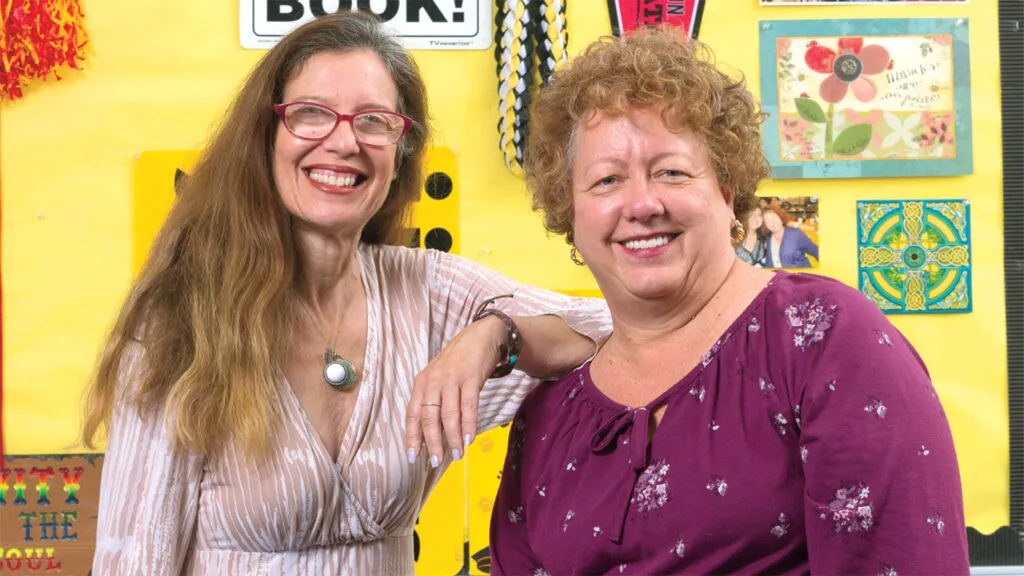Another long, frustrating day teaching high school English via Zoom. I peeled my sticky legs off the faux leather chair in the cramped back room of my house. Well, I got through it. Late August, only two weeks into the semester, and I was ready to pack it in. After 27 years in education, I didn’t need this aggravation.
I pulled up my work email. There was a message from a woman whose name I didn’t recognize: Gigi Shepherd. Was she a new teacher’s aide? “Please tell me how I can join your classes.” I don’t think so. I’d never done any co-teaching. And I certainly wasn’t interested in doing it now with some interloper. Online education was enough of a struggle. Technology was definitely not my strength.
I’d started feeling burned out the year before, during the 2019–20 school year. The expectations kept growing. Many of my teacher friends had retired, leaving me feeling isolated. Then Covid hit. Our district switched to remote learning. Running a virtual classroom was a grind. The one thing I’d still relished about teaching was having a lively exchange of ideas with my students.
No more. Day after day, I spoke into my computer screen with feigned cheerfulness, staring at an array of tiny boxes, only a few showing students’ faces. For privacy reasons, we couldn’t require the kids to turn on their cameras. What passed for dialogue was the occasional terse comment typed in the chat window.
The email from this Gigi woman had to be a mistake. If I have to take on one more thing… Before I could muster the energy to finish the thought, the principal called. She explained that Ms. Shepherd required the passcode that would grant her admittance to my Zoom space.
“It’s good news!” the principal said. “Our district is utilizing substitute teachers’ skills by placing them with full-time educators. It means more help for you.”
“Can’t you put her in another classroom?” I said. “I’m just fine alone.”
“The assignments have been made,” she said. “This will be a good arrangement—trust me.”
Trust. Something else I’d struggled with lately. I told my husband, my friends, even strangers, that I trusted Jesus to guide my life. And I did…when things were going well. But deep down, I knew I’d become less tolerant of change. When things didn’t go as I wanted, I surrendered to worry and second-guessing. Was this what happened with age? Life feels flat–you lose your enthusiasm; work is just a job, not a joy; you get stuck in your ways.
Now here I was, being asked to show some flexibility. I couldn’t exactly say no to the school principal.
That evening, I emailed the interloper, as I’d come to think of her, with directions for joining us online. “Can you at least make sure she’s good with computers?” I asked God as I hit the Send button.
The next morning, my screen was filled with the image of Gigi’s husband, Paul, looming over her as he helped her sign on. Great, that prayer isn’t going to be answered, I thought.
Gigi looked to be about my age. I put her on the spot, asking her to teach a lesson supporting the students’ emotional needs. Without missing a beat, she extolled the virtues of mindfulness. I couldn’t get past the sound of her voice: breathy, sweet yet deliberate, like a grade school teacher.
To my surprise, the students perked up as Gigi led them in a discussion on ways to stay connected. “Remember—even when we’re apart physically from friends and family, we needn’t feel alone.” She was so reassuring.
My teaching style was different. I was encouraging, yes, but louder, more direct, more of a coach than a cheerleader. “C’mon, students!” I’d exhort. “You can do this homework! Seriously. Get it done!”
Gigi was all about heartfelt affirmations and careful listening. And the students responded. In the days that followed, the kids still didn’t speak much, but they filled the chat window with comments that showed they were engaged in what was going on in class.
“Beautiful,” Gigi would coo after a student shared a thought, drawing out her syllables like water burbling in a brook. “Bravo!” she’d offer another time. “I applaud your efforts.”
Her kind words weren’t reserved for students. “I really like the way you express yourself, Lori,” she told me one day after classes. “What a wonderful lesson,” she often said before we signed off. I couldn’t help but be skeptical of her relentless positivity.
“Is anyone really that nice and enthusiastic all the time?” I asked my husband one evening. “Is it some sort of act? She’s got this whispery, doting delivery.” Even as I was talking, I realized how petty I sounded.
“Well, does she connect with the teenagers?” David asked.
“Yes, she does,” I said, grudgingly.
“Then it seems as if whatever she’s doing is working,” he said. “There’s nothing wrong with being sweet.”
This was why I didn’t want to team-teach. I had my own way of doing things. I didn’t need someone making me feel inadequate.
September came, and I found myself settling into a routine. There was an intimacy to online teaching with Gigi because our “classroom” was basically a live stream of our homes. I caught glimpses of her husband and two sons passing through the house. Her German shepherd and my Bernese Mountain dog made appearances. We traded big-dog stories. The students delighted in these diversions and began to turn on their own cameras, sharing more of their lives.
After school, Gigi and I got to know each other better. She’d studied French in college and taught English and French for 12 years before becoming a stay-at-home mom when her sons, Dylan and Jack, were born. When Dylan’s high school French teacher had gone on maternity leave, Gigi had agreed, with her son’s support, to sub for her. She’d been subbing for the past six years.
We talked about our mutual love of movies, food, singing, dancing, family and faith. I shared my grief at losing my mother a few years ago. As the weeks went by, Gigi showed a more serious side too, talking about significant challenges she’d faced in her younger years and how the love of family and friends had gotten her through. “I learned to put my trust in God,” she said.
There was that word again: trust. Only now I understood. Gigi’s ebullient spirit wasn’t some Pollyannaish denial of problems. It was a determination to be grateful, to celebrate life, to choose joy. Not just to talk about faith but to live it. Maybe that was the real reason I’d felt threatened by her. She reminded me of the person I’d been before letting worry and stress grind me down. The person I aspired to be again.
One night, I asked Jesus for direction. “Am I now so brittle and insecure that I can’t just ‘be’ with someone new you’ve brought to my life?”
“Slow down,” I heard him say. “Listen. Speak with kindness. Receive from Gigi. It’s okay to admit you have more to learn.”
Buoyed by Gigi’s presence, I tried to take a more positive tone with students. I used affirmations and meant them. I even practiced speaking more calmly and smoothly—almost the Gigi coo of comfort.
Sometimes Gigi asked me for advice. It was gratifying to think that I could be a help for her too. I looked forward to seeing her each morning, to the rapport we had teaching, to our afterschool chats. She wasn’t an interloper. We were a team.
At the beginning of October, in creative writing class, I shared with the students an essay I’d crafted as a model for an upcoming assignment. They were to write about an object or experience that was meaningful to them. As they followed along onscreen, I read aloud my story of being 14 and desperately wanting my mother to buy me a pair of trendy hip-huggers. She’d resisted because she thought they were too risqué.
I read the final paragraph: “I wish I could ask my mom now about how she managed to stay true to her instincts even though she realized I’d be upset. Her small act took courage….” I choked up and couldn’t go on.
Gigi deftly took the baton from me. “Students,” she said in her gentle voice, “Mrs. Uebersax has given you a great gift. She has opened up and shared a true story beautifully written from her heart.”
I stared at her face on the screen, marveling at her understanding and compassion.
“Now she’s giving you the opportunity to look inside yourselves and write your own story that has meaning and truth,” Gigi continued. “I know some of you have had hard times during this Covid year. But won’t you try to connect with yourselves and with us by expressing yourself through your writing?”
For a moment, no one said a word. It felt like a sacred silence.
In mid-October, Gigi and I finally arranged to meet at a park. I was blind-date nervous. Would our carefully forged online bond feel the same in person?
After a quick, awkward hug, we sat in lawn chairs eight feet apart, Gigi’s long hair whipping in the wind. Her face glowed as she savored a chocolate croissant I’d brought her. “I just want to be quiet for a moment and take it in,” she said.
Then she played a samba song on her phone, and we danced a bit, swaying to the rhythm. I felt delightfully young, the pressures and worries of the past year lifted.
“I’m so glad we were teamed up together,” Gigi said. “You feel like my soul sister.”
As usual, she’d said it better than I could have. But I didn’t mind. It wasn’t a competition. No matter how the school year unfolded, I knew I would be grateful to share every day with my trusted colleague Gigi, the wonderful new friend God knew I needed even before I did.
For more inspiring stories, subscribe to Guideposts magazine.





